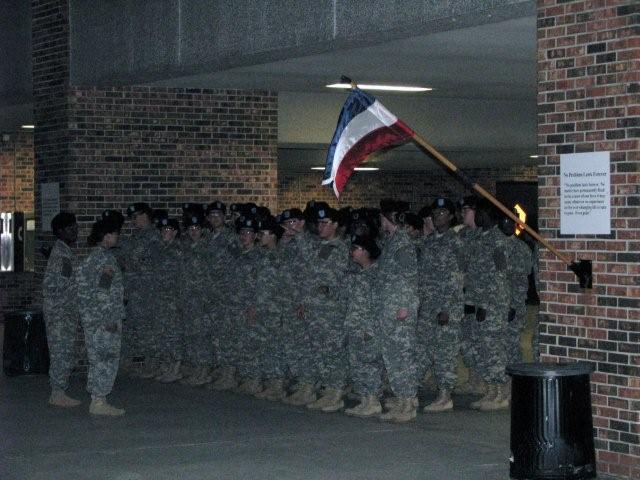Obscure U.S. Army program proves popular road for immigrants to gain citizenship
Immigrants to the United States can get on the fast track to citizenship if they speak one of 44 languages the military has identified as essential. They can become citizens as soon as basic training, pictured, is over. (Photo courtesy of the U.S. Army.)
The U.S. Army in 2009 launched a yearlong program allowing immigrants with certain language skills or medical training to enlist in the military and receive citizenship by the end of basic training — basically in just 10 weeks.
The program was a wild success, enticing nearly 1,000 people to join up, with thousands more on a wait list.
The program has been brought back for a second trial period this October. Already, about 200 people have enlisted. One of them is Yoon Young Kim, a South Korean national. He joined the Army just a few weeks ago and is set to leave for basic training in April.
By the end of summer, he’s scheduled to raise his hand again to swear another oath, this time as a U.S. citizen.
When Kim came to the U.S. eight years ago to study nursing, he never thought he’d be enlisting in the U.S. military. Certainly not at age 32. He worries about his English and keeping up physically with a bunch of 20-year-olds at boot camp.
“Mentally, probably I’m better than them, but physically I’m weak,” he said. “So right now I’m trying to work on myself for push-ups, sit-ups and running.”
Before enlisting, Kim was getting frustrated trying to find a job in nursing. His visa was running out. That’s why he leaped at the chance at fast track citizenship from the U.S. Army.
Immigrants fighting for the American military is nothing new. A substantial number of people who have served in the military during wartime have been immigrants. But things changed after 9/11. A new federal rule required legal immigrants to have a green card to be able to enlist. Suddenly the Army was forced to turn away thousands of qualified applicants.
“I would get calls from people in the military,” said immigration attorney and retired Army Lt. Col. Margaret Stock. They would say “‘hey, how come Tanya so-and-so just walked into the recruiters office and she’s got a U.S. high school diploma and speaks three languages and has got high test scores but I’m not allowed to let her in because she’s not got a green card,’ and they’d call me to try and get her a green card.”
And then an idea came to Stock. What if the military took advantage of a legal loophole Stock discovered in a statute passed by Congress.
“A person who didn’t meet the normal criteria could voluntary enlist if the person’s enlistment was vital to the national interest,” she said.
That loophole became the Military Accessions Vital to The National Interest, or MAVNI, program. The U.S. military today has missions all over the world and recruiting men and women who speak the local language and know the local culture is vital. Yoon Young Kim hopes his Korean language skills might be useful in monitoring North Korea.
It turns out many other Koreans are as ready as Kim. While there are 44 desired languages on the MAVNI recruitment list, from Russian and Hindi to smaller Filipino dialects like Cebuano or Moro, Korean speakers have signed up in droves.
The force behind this swell of enthusiasm is James Hwang. If you have a question about the MAVNI program he’s the person to contact.
“I got almost more than 100 emails per day,” said Hwang, who is a civilian.
He always wanted to serve in the Army but when he visited a recruiter years ago without a green card, he was turned away. Then he heard about MAVNI and made it his mission to spread the word about the program to other Koreans. He hosts information sessions in his home and fields questions on Facebook.
He is even responsible for two MAVNI marriages. Why does he do it?
“There were many people before this program who were on a non-immigrant visa for many years,” Hwang said. “They didn’t really have very much hope for becoming a permanent resident because of the backlog of the U.S. immigration system.”
So Hwang’s effort has led to an overwhelming number of Koreans applying.
“The Korean community got so enthusiastic and mobilized about the program,” Stock said, “that if we had let the program run first-come, first-serve we probably would’ve ended up with 800 Korean language speakers and nobody from any other language groups.”
The Army ended up putting a quota on Korean speakers. Stock is happy that MAVNI is so popular, but she says the program shouldn’t really exist. What MAVNI really points to is a broken immigration system.
“If our nation had comprehensive immigration reform — if we had a legal immigration system that worked — we wouldn’t need a program like MAVNI,” she said. “We could just draw on the population of people living in the U.S. with green cards.”
Yoon Young Kim, though, smiles at his good fortune. He was one of the last Korean citizens to enlist before the Korean language quota was met last month. Of course not everyone understood his decision to serve. When he told his parents in South Korea that he was going to join the Army they were shocked. “I just said, ‘Mom and Dad,l I’m not applying to the US military to die I’m not applying to live, to survive.’”
